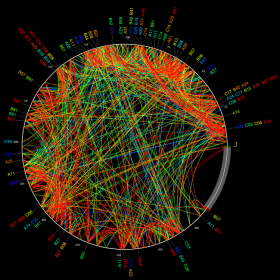Influence of HLA-C Expression Level on HIV Control
- Richard Apps ,
- Ying Qi ,
- Jonathan M. Carlson ,
- Haoyan Chen ,
- Xiaojiang Gao ,
- Rasmi Thomas ,
- Yuko Yuki ,
- Greg Q. Del Prete ,
- Philip Goulder ,
- Zabrina L. Brumme ,
- Chanson J. Brumme ,
- Mina John ,
- Simon Mallal ,
- George Nelson ,
- Ronald Bosch ,
- David Heckerman ,
- Judy L. Stein ,
- Kelly A. Soderberg ,
- M. Anthony Moody ,
- Thomas N. Denny ,
- Xue Zeng ,
- Jingyuan Fang ,
- Ashley Moffett ,
- Jeffrey D. Lifson ,
- James J. Goedert ,
- Susan Buchbinder ,
- Gregory D. Kirk ,
- Jacques Fellay ,
- Paul McLaren ,
- Steven G. Deeks ,
- Florencia Pereyra ,
- Bruce Walker ,
- Nelson L. Michael ,
- Amy Weintrob ,
- Steven Wolinsky ,
- Wilson Liao ,
- Mary Carrington
Science | , Vol 340(6128): pp. 87-91

HLA-C expression and HIV immune control
 In collaboration with Mary Carrington’s group, we showed in Science that the quantity of HLA-C surface protein correlates with HIV disease progression, the probability than HLA-C epitopes will be targeted by the immune system, and the probability that HIV will escape within those epitopes. Mary further showed that HLA-C expression levels are linked to some auto-immune diseases. This is an important study that highlights the the role of HLA-C (which is generally ignored in the field) and de
In collaboration with Mary Carrington’s group, we showed in Science that the quantity of HLA-C surface protein correlates with HIV disease progression, the probability than HLA-C epitopes will be targeted by the immune system, and the probability that HIV will escape within those epitopes. Mary further showed that HLA-C expression levels are linked to some auto-immune diseases. This is an important study that highlights the the role of HLA-C (which is generally ignored in the field) and de![]() monstrates how our models of selection can be used to generate and test hypotheses. As always, this was a hugely collaborative effort, making key use of data from Philip Goulder, Zabrina Brumme and many others. The MSR Connections team wrote a blog post providing a nice high-level description.
monstrates how our models of selection can be used to generate and test hypotheses. As always, this was a hugely collaborative effort, making key use of data from Philip Goulder, Zabrina Brumme and many others. The MSR Connections team wrote a blog post providing a nice high-level description.
Abstract
A variant upstream of human leukocyte antigen C (HLA-C) shows the most significant genome-wide effect on HIV control in European Americans and is also associated with the level of HLA-C expression. We characterized the differential cell surface expression levels of all common HLA-C allotypes and tested directly for effects of HLA-C expression on outcomes of HIV infection in 5243 individuals. Increasing HLA-C expression was associated with protection against multiple outcomes independently of individual HLA allelic effects in both African and European Americans, regardless of their distinct HLA-C frequencies and linkage relationships with HLA-B and HLA-A. Higher HLA-C expression was correlated with increased likelihood of cytotoxic T lymphocyte responses and frequency of viral escape mutation. In contrast, high HLA-C expression had a deleterious effect in Crohn’s disease, suggesting a broader influence of HLA expression levels in human disease.
